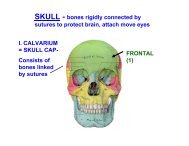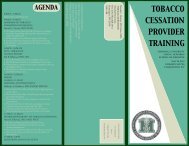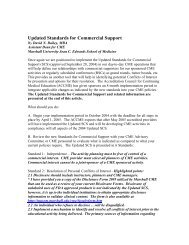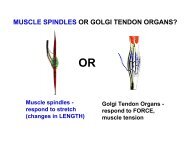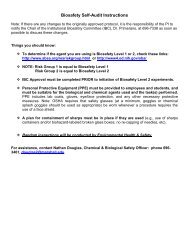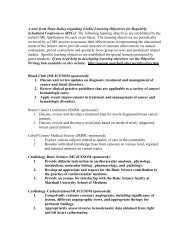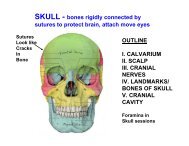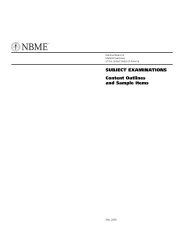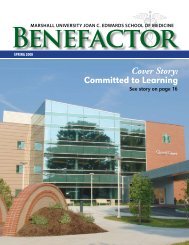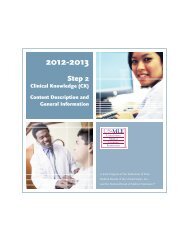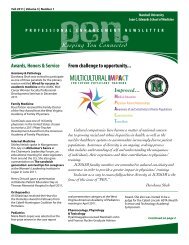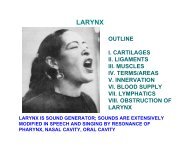FA 5 Progress Report WV-INBRE - Joan C. Edwards School of ...
FA 5 Progress Report WV-INBRE - Joan C. Edwards School of ...
FA 5 Progress Report WV-INBRE - Joan C. Edwards School of ...
- No tags were found...
Create successful ePaper yourself
Turn your PDF publications into a flip-book with our unique Google optimized e-Paper software.
Program Director/Principal Investigator (Last, First, Middle): Rankin, Gary O 70EPICARDIAL <strong>FA</strong>T BIOMARKERS IN PATIENTS WITH CORONARY ARTERY DISEASE INAPPALACHIA (0036)TYPE:%IDeA $:Research SubprojectIDeA $: 0INVESTIGATOR, DEGREESantanam, Nalini PHDCushman, Kenneth PHDDEPARTMENTPharmacology,Physiology & ToxBiologyNON-HOST INSTITUTION: STATE,COUNTRYWest Liberty University, Wv UsaTotal # human subjects expected for entire study: 100Total # human subjects enrolled to date: 60SUBPROJECT DESCRIPTIONObesity is highly prevalent in United States, especially in the Appalachian Region. Obesity increases risk tocardiovascular disease and diabetes. An understanding <strong>of</strong> factors that are altered during obesity will help inits prevention. Recent studies speculate that changes in epicardial fat – (EF, the fat that surrounds the heart)derived mediators will alter cardiac function. The present study will attempt to identify unique fat biomarkersfrom EF that could be used as predictors <strong>of</strong> cardiovascular risk or as potential therapeutic targets in patientswith or without coronary artery disease (CAD). EF and subcutaneous fat (SF) from consented <strong>WV</strong> patientswith and without CAD undergoing either coronary artery bypass graft surgery or valve surgery at St. Mary’sHeart Center, Huntington, <strong>WV</strong> will be obtained. Fat derived biomarkers will bemeasured in the samples that are collected. In Aim 1: Circulating and fat derived biomarkers will be identifiedusing multiplex ELISAs and real time PCR. Aim 2: Expression pr<strong>of</strong>iling <strong>of</strong> genes in the human genome willbe performed on paired EF and subcutaneous fat obtained from all patients In Aim 3: the relative abundance<strong>of</strong> human microRNA (the noncoding RNAs that are master regulators <strong>of</strong> mRNA) in EF and subcutaneous fatwill be determined via microarray-based pr<strong>of</strong>iling. The biochemical findings will be correlated to the clinicalfindings obtained from the Society <strong>of</strong> Thoracic Surgery database. This translational type <strong>of</strong> grant will addressfour out <strong>of</strong> the five major goals <strong>of</strong> the parent <strong>WV</strong><strong>INBRE</strong> award. This grant involves interactions betweeninvestigators and clinicians at Marshall University (lead institution) and West Liberty University (partnerinstitute). It will give an opportunity for undergraduate and medical students in translational research trainingand help with hiring or retaining <strong>WV</strong> residents.SUBPROJECT PROGRESSIntroduction/Background: The long term goal <strong>of</strong> this translational project is to better understand therole <strong>of</strong> epicardial fat specific molecular markers in cardiovascular risk in patients with coronaryartery disease in the Appalachian region. The immediate goal <strong>of</strong> this project is to identify unique fatbiomarkers in epicardial fat obtained from West Virginia patients with and without coronary arterydisease (CAD) undergoing thoracic surgery.Specific Aims: The following specific aims will be performed using the samples obtained fromthese patients:Specific Aim 1: Identify differences in expression <strong>of</strong> circulating and fat biomarkers in <strong>WV</strong> patientswith CAD and non-CAD: Fat specific biomarkers will be measured in the EF and SF obtained fromboth CAD and non-CAD <strong>WV</strong>-patients to identify unique biomarkers between the paired fat depots.Specific Aim 2: Expression pr<strong>of</strong>iling <strong>of</strong> EF and SF to identify unique fat biomarkers in <strong>WV</strong> patientswith CAD and non-CAD: Expression pr<strong>of</strong>iling using Agilent Whole Human Genome 4 x 44 Kmicroarrays will be performed on EF and SF samples obtained from CAD and non-CAD<strong>WV</strong>-patients to identify unique genes in epicardial fat that are altered during coronary arterydisease.PHS 2590 (Rev. 06/09)Continuation Format Page



